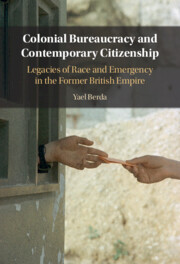Book contents
- Colonial Bureaucracy and Contemporary Citizenship
- Colonial Bureaucracy and Contemporary Citizenship
- Copyright page
- Contents
- Figures
- Preface
- Acknowledgments
- Archive Abbreviations
- Introduction: The Spectacle of Independence and the Specter of Bureaucracy
- Part I Hybrid Bureaucracy: How Race and Emergency Shaped the Organization of Colonial Rule
- Part II The Axis of Suspicion: Classifications of Identity and Mobility in Crises
- Part III Administrative Memory and the Legacies of Emergency
- 4 Loyalty and Suspicion: The Making of the Civil Service after Independence
- 5 How Hybrid Bureaucracy and Permit Regimes Made Citizenship
- Conclusion: The File and the Checkpoint – Colonial Bureaucracy and the Making of Contemporary Citizenship
- Notes
- Bibliography
- Index
5 - How Hybrid Bureaucracy and Permit Regimes Made Citizenship
from Part III - Administrative Memory and the Legacies of Emergency
Published online by Cambridge University Press: 10 November 2022
- Colonial Bureaucracy and Contemporary Citizenship
- Colonial Bureaucracy and Contemporary Citizenship
- Copyright page
- Contents
- Figures
- Preface
- Acknowledgments
- Archive Abbreviations
- Introduction: The Spectacle of Independence and the Specter of Bureaucracy
- Part I Hybrid Bureaucracy: How Race and Emergency Shaped the Organization of Colonial Rule
- Part II The Axis of Suspicion: Classifications of Identity and Mobility in Crises
- Part III Administrative Memory and the Legacies of Emergency
- 4 Loyalty and Suspicion: The Making of the Civil Service after Independence
- 5 How Hybrid Bureaucracy and Permit Regimes Made Citizenship
- Conclusion: The File and the Checkpoint – Colonial Bureaucracy and the Making of Contemporary Citizenship
- Notes
- Bibliography
- Index
Summary
“How Hybrid Bureaucracy and Permit Regimes Made Citizenship” tracks the bureaucratic response to the violence of partition, war, and independence in each of the states, focusing on the mobility regimes established to prevent return in Israel and India, where the documents and evidentiary demands of the mobility regimes enabled claims to citizenship. Focusing on the adoption of the colonial bureaucratic toolkit of emergency by the governments of independent India and Israel to restrict the mobility of returning Muslim and Palestinian refugees, the chapter show how mobility restrictions became obstacles to claims to citizenship. Demonstrating how the transfer of bureaucratic practices governing mobility depended on the continuity of emergency laws, this chapter shows the divergent outcome in Cyprus, which relinquished emergency laws at independence.
Keywords
- Type
- Chapter
- Information
- Colonial Bureaucracy and Contemporary Citizenship , pp. 161 - 201Publisher: Cambridge University PressPrint publication year: 2022

